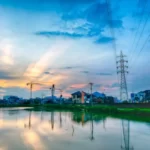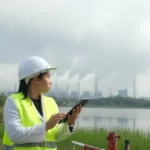Featured articles
-
Case studies of cities using geothermal energy successfully
April 28, 2024 -
Geothermal education and awareness-raising
April 28, 2024 -
Geothermal energy and sustainable development
April 28, 2024
Beyond its environmental and economic benefits, geothermal energy, drawing on the Earth’s natural heat, can have significant social impacts on local communities. By offering a renewable, local and stable source of energy, geothermal energy can help improve quality of life, create jobs and foster local economic development.
Exploring the positive social impacts of geothermal energy
Integrating geothermal energy into local energy systems can generate positive social impacts:
- Improved quality of life: Geothermal energy provides access to clean, affordable heating and domestic hot water, contributing to the comfort and well-being of residents.
- Job creation: The development of geothermal projects stimulates local economic activity by creating jobs in construction, engineering, maintenance and project management.
- Economic diversification: Geothermal energy can help diversify the local economy, reducing dependence on traditional industries and attracting new businesses and investment.
- Improving public health: Substituting geothermal energy for fossil fuels helps reduce air pollution and greenhouse gas emissions, thereby improving air quality and public health.
- Strengthening social cohesion: Geothermal projects can encourage community participation and strengthen social ties by involving local residents in the decision-making and management process.
Examples of communities benefiting from the social impacts of geothermal energy
Many communities around the world have already reaped the social benefits of geothermal energy:
- Taupo, New Zealand: The New Zealand town of Taupo is famous for its geysers and geothermal hot springs. The exploitation of geothermal energy for heating, electricity and tourism has contributed to the town’s economic prosperity and the creation of jobs for the local population.
- Larderello, Italy: The Italian town of Larderello is a historic center of geothermal energy production. Geothermal energy has enabled the town to grow and create jobs while preserving its unique natural environment.
- Prescott, Arizona, USA: The American town of Prescott has installed a geothermal heating system that supplies heat to over 80% of the town’s buildings. The project has created jobs, reduced energy costs for local residents and cut greenhouse gas emissions.
Conclusion
Geothermal energy is proving to be a promising source of energy not only for its positive environmental impact, but also for its beneficial social spin-offs. By helping to improve quality of life, create jobs and diversify the local economy, geothermal energy can play a key role in building a fairer, more inclusive energy future.
Key factors for maximizing the social impact of geothermal energy :
- Involving local communities: Involving local communities from the earliest stages of geothermal projects is essential to ensure their acceptance and active participation.
- Development of training and education programs: Geothermal-specific training and education programs can help local residents acquire the skills they need to work in this sector and benefit from the economic opportunities it offers.
- Establishing benefit-sharing mechanisms: Fair mechanisms for sharing the benefits generated by geothermal projects can help reduce poverty and improve living conditions for local populations.
- Respecting land and property rights: It is important to respect the land and property rights of local communities when developing geothermal projects, in order to avoid conflicts and ensure a fair distribution of benefits.
In conclusion, geothermal energy can be a catalyst for positive social change, helping to build fairer, more inclusive and more sustainable societies. By adopting an inclusive and responsible approach, local communities can reap the full social benefits of geothermal energy, while preserving their cultural and environmental heritage.



